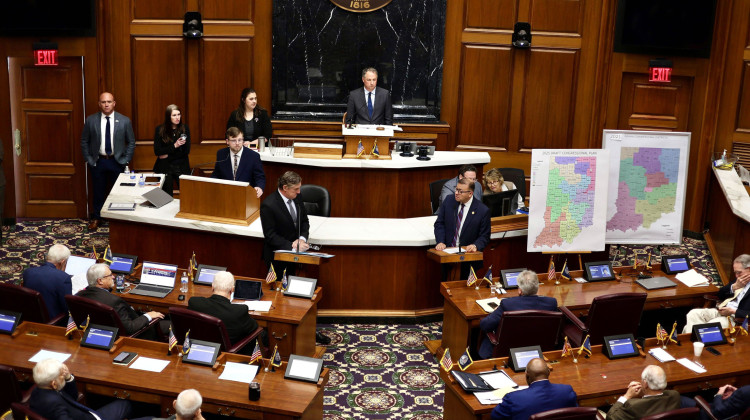
Lee Ivey, Presley Gillespie, and Teena Turner are members of the city's CLCR Team.
Katrina Pross/WFYI NewsIn the basement of downtown Indianapolis’ City-County Building, Haleigh Rigger speaks into a handheld radio.
“Clinician one control,” Rigger says. She’s a mental health clinician, notifying police dispatch that she and her team of professionals are ready to respond to nonviolent mental health calls.
“Ten o’clock check-in,” says team member Teena Turner. “Right on time.”
The Clinician-led Community Response Team is deployed across the city’s downtown district. There are no police or members of law enforcement on the team, an arrangement that has never existed in Indianapolis before.
Community members and advocates have called for this type of response for years. Police responding to mental health crises can escalate an already tense situation, experts say, and the results can be deadly.
The CLCR Team has been operating in Indianapolis since July 1. So far, they’ve responded to more than 50 calls.
The team has received widespread support from city leaders. But some community members warn that it’s essential the team expand their hours and reach as soon as possible.
How the team works
The city announced a pilot program for the team last year with $2 million in funding, which was included in Indianapolis Mayor Joe Hogsett’s 2023 budget. The city put out a request for proposals to recruit organizations interested in leading the initiative.
The city charged Stepping Stones Therapy Center with the task.
“I thought it’s just something that would benefit the community, just not having the police involved and just seeing clinicians come,” said Stepping Stones CEO Yvette Wilson. “It just might deescalate the situation, and they may be more willing to help and just a better outcome.”
The CLCR Team operates every day from 10 a.m. to 8 p.m. The units consist of a clinician and a peer specialist. When they respond to a call, a program manager remains at their office and keeps in touch with the team.
“If there is immediate danger, then obviously, if it's any type of threat, then safety is our number one concern for our clinicians,” said Andrea Brown, director of operations for the CLCR Team.
Brown clarified that if a weapon is present on the scene, such as in a home or in someone’s car, that would not automatically disqualify the CLCR Team from responding.
“Just the word gun does not mean that we're not going to respond,” she said.
The CLCR Team handles a variety of calls. In one instance, the team helped a person struggling with suicidal ideation. During another incident, they assisted someone with dementia who got separated from their family. Sometimes people just need someone to talk to, staff members said.
If needed, the team can transport individuals to a hospital, or a treatment facility like the Assessment and Intervention Center located at the city’s Community Justice Campus. The team also follows up with people for whom they provide care.
Currently, the group only operates in the city’s downtown district. The downtown district encompasses an area of about 3.5 square miles.
The team operates in three-person shifts for 10 hours at a time. They usually work for three days in a row, and then have three days off before they return to work.
Clinician Lee Ivey said he considers his job is to be a “professional listener.”
“I show up for people and I meet them where they are,” he said. “Try to create space for them to feel as comfortable as possible to speak their needs and feel safe while they're doing it.”
Ivey keeps a police radio with him at all times, listening to see if a call comes in that lies within the CLCR’s scope. If it fits the team’s criteria, then he and a peer specialist will respond.
Presley Gillespie is a peer specialist, a role that was included on the CLCR Team so people who have gone through similar mental health experiences could be part of the response. She said success for the team means making sure that people feel seen and heard.
“A lot of times interpersonal communication is so overlooked,” she said. “The connection that we have human to human is so special, and it's so important. And I feel like people lose sight of that. But it's paramount.”

When the clinicians and peer specialists respond to a call, a program manager like Teena Turner stays behind at the City-County Building.
“I pretty much stay and make sure that they have all the information I need, that the team is safe,” she said. “And any questions or information that they may need, they can always call and speak to me.”
After the clinician and peer specialist respond to an incident, they head back to the CLCR office and meet with the program manager. They discuss how it went, what care they gave, and what their next steps should be.
Why clinicians respond to some incidents instead of police
Advocates have long called for a team to respond to mental health incidents without police.
According to the Washington Post, about 20 percent of all people killed by police since 2015 were experiencing a mental health crisis. Other cities like Eugene, Oregon and Denver, Colorado have teams to respond to mental health related calls without law enforcement.
Indianapolis looked at those programs to build the model for the CLCR program. The initiative also has to fit within the city’s current emergency response system.
A 911 dispatcher triages the calls they receive for the best available responder. If there is a possible public safety threat, such as when a weapon is involved, then the Indianapolis Metropolitan Police Department will respond – or the Mobile Crisis Assistance Team, MCAT, if that unit is on duty.
The MCAT program began in 2017 to respond to some mental health calls. The team includes a clinician from Eskenazi Health, and an IMPD officer. MCAT operates from 8 a.m. to 6 p.m. on weekdays.
But community members voiced their concerns that MCAT was not enough, and argued that police should not respond to mental health calls at all. They also pushed to have a team available all hours of the day, seven days a week.
Bianca Harris owns the Phoenix Nicholas Center in Indianapolis, which focuses on closing the gap in equitable services for Black and Brown people in the mental health system. Harris also organizes with Faith in Indiana’s Black Church Coalition, an advocacy group that has called for a clinician-led response.
The presence of uniformed and armed officers can make the person in crisis feel like they are in trouble, Harris said.
“We have to keep in mind that when we come to someone who's in crisis, we're not just only dealing with that crisis at the moment, we are also dealing with all of their history that has led up to that crisis,” Harris said. “And the relationship between police departments and people of color specifically, it's not a fairy tale. There's lots of problems, and it's highly problematic in certain ways.”
Harris was contracted by the city to help start the CLCR pilot. She said she was eager to get involved.
“When we started talking about – how do we revolutionize mental health? How do we have equitable access? I'm like ‘yes,’ because I don't have anywhere I can send my Black clients, I can't tell you to call 911 comfortably and not know who's going to show up,” Harris said.
CLCR clinician Ivey has been working in mental health for about a decade. He said he hopes the team can respond and save lives, especially for those who are Black and Brown and have had traumatic encounters with the police.
Calls for a team with the expertise to handle those calls, provide mental health care, and prevent the loss of life increased after Herman Whitfield III was killed last year.
Whitfield’s mother called 911 at about 3:30 a.m. on April 25, 2022. Whitfield was having a mental health crisis, and his parents wanted him to be taken to a hospital. Instead, six police entered their home, tased Whitfield twice, and placed him in the prone position until he became unresponsive. He was pronounced dead about an hour later at a nearby hospital.
“My heart is heavy thinking about that right now,” Ivey said. “And that's the exact reason why this team has been established, to show up for the Herman Whitfields of the city. And see to it that the same thing doesn't happen again. That's why we're here.”
Recent deaths after police respond to mental health crises prompt concern
For some, such as those who knew Herman Whitfield III, there are still questions about how effective the program could ultimately be.
Gladys and Herman Whitfield, Jr. are Herman Whitfield III’s parents. They were there the night of their son’s mental health crisis. Gladys Whitfield called 911. Herman Whitfield, Jr. answered the door when police showed up, telling them that an ambulance should be there.
The Whitfields emphasize that they are supportive of the team. But they said they wonder why the team’s pilot hours are during the day, and not at night. In their son’s case, the mental health crisis happened at nearly 3:30 a.m.
“And then regarding people who have issues outside of business hours, that's a question – I just don't see an answer to it right now,” Gladys Whitfield said.
The pilot program plans to increase its hours to 24 hours a day, seven days a week in the downtown district by the end of this year. But to do so, the team first has to increase its size.
Once the team reaches 24/7 capacity, it hopes to expand to the city’s east district starting next year.
In a statement, the Office of Public Health and Safety underlined that the team has the funding to expand its hours, but doesn’t have the staff to do so yet. Currently, 13 people are on staff. OPHS said 23 are needed for around-the-clock coverage.
“Stepping Stones Therapy Center is continuing to hire personnel to allow for the expansion to full time coverage,” the statement said.
The Whitfields said it’s hard to know what would have happened that night if the CLCR Team had existed. But they think it would have been a different outcome.
“Our son could still be here and still be doing good things and laughing and talking with us and hugging us,” Gladys Whitfield said. “We don't have that anymore.”
More recent incidents have also highlighted the importance of finding the best response to someone in crisis. In late August, IMPD shot and killed 40-year-old Kendall Darnell Gilbert. According to IMPD and others involved, he experienced multiple mental health episodes over the course of a weekend.
Police said Gilbert was threatening others with a machete.
IMPD said that MCAT was not working at the time, and that because Gilbert was armed, it was not a case for which the CLCR would provide help. The situation also unfolded at a residence that was not located in the city’s downtown district.
IMPD said that a psychologist was at the scene assisting the Crisis Negotiation Unit.
At a town hall meeting the night after Gilbert was killed, community members voiced frustration over police responding to mental health incidents.
IMPD Chief Randal Taylor addressed the broader issue at the department’s budget hearing before the Indianapolis City-County Council’s Public Safety and Criminal Justice Committee.
“I believe that law enforcement should be the last resort in issues related to mental health, not the first,” Taylor said.
Creating a sustainable program
Now that the pilot program is underway, team members are trying to let people in the city know that it exists.
On a hot day in early August, Haleigh Rigger and Peer Support Specialist Camesia Davidson walked through downtown Indianapolis. They passed out flyers, water, food and socks to unhoused people.
They also told them about the CLCR Team.

“We’re a new program with the city,” Rigger said to a woman sitting on the street. “If you know someone who's got a mental health emergency and they need some support you can call 911 and we'll respond instead of police. It's just a therapist and peer support specialist.”
Though the program is in its early days, the team already knows the CLCR program needs more money to continue.
In August, the city’s Office of Public Health and Safety Director Martine Romy Bernard-Tucker asked the Indianapolis City-County Council to allocate an additional $1 million to the CLCR Team. The proposed funding is part of Hogsett’s 2024 budget, which the council is set to vote on in October.
Bernard-Tucker said she hopes that the CLCR Team can eventually expand to encompass the entirety of Indianapolis, and not just the downtown and east districts. But she said there is no timeline on when that might happen.
“If everything goes well, and I don't have any reason to think it's not gonna go well, the goal is to serve everyone in Indy,” she said.
Ivey said he is grateful that the city is investing money into mental health.
“It was really beautiful to hear the city acknowledging that mental health is an issue in our city, and so they want to do something about it,” he said.
Contact WFYI criminal justice reporter Katrina Pross at kpross@wfyi.org. Pross is a Corps Member of Report for America, an initiative of The GroundTruth Project.
 DONATE
DONATE








 Support WFYI. We can't do it without you.
Support WFYI. We can't do it without you.